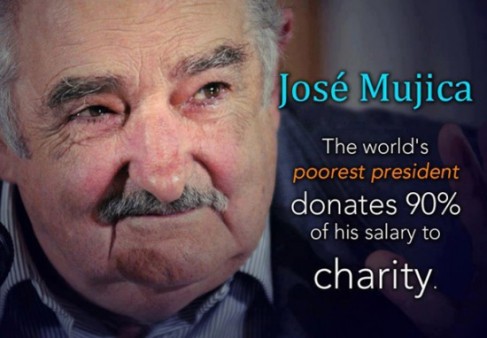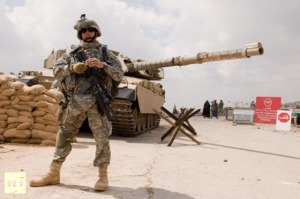The Islamic Republic has survived for so long because its basic model is, according to numerous surveys, what a majority of Iranians actually want, write Flynt Leverett and Hillary Mann Leverett.
Middle East Online
Fifty years ago, during the Cuban missile crisis, the United States faced what is frequently described as the defining challenge of the Cold War. Today, some argue that America is facing a similarly defining challenge from Iran’s nuclear activities. In this context, it is striking to recall President John Kennedy’s warning, proffered just months before the missile crisis, that “the great enemy of the truth is very often not the lie — deliberate, contrived and dishonest — but the myth — persistent, persuasive and unrealistic. Too often we hold fast to the clichés of our forebears. We subject all facts to a prefabricated set of interpretations. We enjoy the comfort of opinion without the discomfort of thought.” Half a century later, Kennedy’s warning applies all too well to America’s discussion — it hardly qualifies as a real debate — about how best to deal with the Islamic Republic of Iran.
For more than thirty years, American analysts and policy-makers have put forward a series of myths about the Islamic Republic: that it is irrational, illegitimate and vulnerable. In doing so, pundits and politicians have consistently misled the American public and America’s allies about what policies will actually work to advance US interests in the Middle East.
The most persistent — and dangerous — of these myths is that the Islamic Republic is so despised by its own people that it is in imminent danger of overthrow. From the start, Americans treated the Iranian Revolution of 1978-79 as a major surprise. But the only reason it was a surprise was that official Washington refused to see the growing demand by the Iranian people for an indigenously generated political order free from US domination. And ever since then, the Islamic Republic has defied endless predictions of its collapse or defeat.
The Islamic Republic has survived because its basic model — the integration of participatory politics and elections with the principles and institutions of Islamic governance and a commitment to foreign policy independence — is, according to polls, electoral participation rates and a range of other indicators, what a majority of Iranians living inside the country want. They don’t want a political order grounded in Western-style secular liberalism. They want one reflecting their cultural and religious values: as the reformist President Mohammad Khatami put it, “freedom, independence and progress within the context of both religiosity and national identity.”
That’s what the Islamic Republic, with all its flaws, offers Iranians the chance to pursue. Even most Iranians who want the government to evolve significantly — for example, by allowing greater cultural and social pluralism — still want it to be the Islamic Republic. After Iran’s 2009 presidential election, when former Prime Minister Mir Hossein Mousavi lost to the incumbent president, Mahmoud Ahmadinejad, Western elites and Iran “experts” portrayed the Green Movement that morphed out of Mousavi’s campaign as a mass popular uprising poised to sweep away the Islamic Republic. But the Greens, even at their height, never represented anything close to a majority of Iranians, and within a week of the election, their social base was already contracting. The fundamental reason was that, after Mousavi failed to substantiate his charge of electoral fraud, the Greens’ continued protests were no longer about a contested election, but a challenge to the Islamic Republic itself — for which there was only a negligible constituency.
While many Westerners prefer to believe that the Greens did not fade because of their own weaknesses, but because of cruel suppression by an illegitimate regime, this does not hold up to scrutiny. In the fifteen months preceding the shah’s 1979 departure, his troops gunned down thousands of protesters — and the crowds demanding his removal kept growing. In 2009, police brutality unquestionably occurred in the course of the government’s response to post-election disturbances. The government itself acknowledged this — for example, by closing a prison where some detainees were physically abused and murdered, and by indicting twelve of that prison’s personnel (two were later sentenced to death). But fewer than 100 people died in the clashes between demonstrators and security forces after the 2009 election, and still the Greens retreated and their base shrank.
Western human rights groups estimate that 4,000 to 6,000 Iranians were arrested in connection with protests following the 2009 election. More than 90 percent were released without charge. As of 2010, Western human rights organizations did not dispute official Iranian figures that about 250 were convicted of crimes stemming from the unrest, with perhaps 200 other cases still pending. Most were pardoned by Supreme Leader Ayatollah Ali Khamenei; most who were not are free on bail pending appeals. According to a survey by Craig Charney, a former pollster for Bill Clinton and Nelson Mandela, most Iranians saw their government’s response to the unrest as legitimate.
Notwithstanding the Islamic Republic’s staying power, American policy elites and Iran “experts” with no direct connection to the on-the-ground reality inside the country continue to advance the myth of the Islamic Republic’s illegitimacy and fragility, with the idea that if we just believe in it enough, we will somehow sweep away the challenge Iran poses. Today, this myth comes in two interlocking versions: that sanctions are “working” to promote US objectives vis-à-vis Iran, and that the Arab Awakening has left it isolated in its own neighborhood.
* * *
Many commentators now posit that the economic hardships caused by the sanctions will soon prompt Iranians to rise up and force fundamental change in their country — or at least compel their government to make the concessions demanded by Washington. But those making this argument have never explained why the economy is so much worse today than it was in the 1980s, when Iran lost half its GDP during the war with Iraq — and yet even then, its population did not rise up to force fundamental change or concessions to hostile powers.
Indeed, there is no precedent anywhere for a sanctioned population mobilizing to overthrow the government and replace it with one that would adopt the policies preferred by the sanctioning foreign power. Even in Iraq, where crippling sanctions were imposed for more than a decade, killing more than 1 million Iraqis (half of them children), the population did not rise up to overthrow Saddam Hussein. In the end, Saddam was displaced only by a US invasion — and even after that, Iraqis did not set up a pro-American, secular, liberal government ready to subordinate Iraq’s sovereignty and national rights to Washington’s preferences.
Last year, Western pundits hyperventilated about “hyperinflation” in Iran, arguing that a sharp devaluation in the country’s currency would turn the people against the government. This assessment, like so many similar projections before it, proved fanciful. The Iranian rial has been overvalued for more than a decade, underwriting the rising consumption of imported goods by upper-class Iranians that has cost the economy billions of dollars, hurt prospects for farmers and domestic manufacturers, and constrained Iran’s non-oil exports. The recent devaluation of the rial has aligned its nominal value with its real value; as the rial has dropped, Iran’s non-oil exports have expanded significantly. At the same time, the government is disbursing its foreign exchange holdings to defend a lower exchange rate for essential imports like food and medicine.
While no one in Iran is immune from the impact of currency devaluation, the rural poor and those involved in export-oriented sectors are in a relatively advantageous position. There are no discernible food shortages; stores of all sorts are fully stocked, with significant customer traffic. Shortfalls are emerging in some imported medicines. This, however, is not because of currency devaluation. Rather, it is a function of the US-instigated banking sanctions that, contrary to official US rhetoric about their “targeted” nature, make it difficult for Iranians to pay for Western medical and pharmaceutical imports, even though selling such items to Iran is technically allowed under US sanctions regulations. Certainly, anyone who has walked the streets of Tehran recently (as we did in December) can see that Iran’s economy is not collapsing, and anyone who has talked with a range of Iranians inside the country knows that the sanctions will not compel either the Islamic Republic’s implosion or its surrender to US demands on the nuclear issue. There is no constituency — among conservatives, reformists or even what’s left of the Green Movement — prepared to accept such an outcome.
Sanctions advocates continue to claim that it’s different this time, partly because a “demonstration effect” from the Arab Awakening will reinforce the impact of sanctions to break the Islamic Republic’s back. In Tehran, however, policy-makers and analysts see the Arab Awakening as hugely positive for the Islamic Republic’s regional position. They judge – correctly — that any Arab government that becomes more representative of its people’s beliefs, concerns and preferences will be less enthusiastic about strategic cooperation with the United States, let alone Israel, and more open to the Islamic Republic’s message of foreign policy independence.
More particularly, one hears in Washington that, because of the Arab Awakening, Tehran is going to “lose Syria,” its “only Arab ally,” with dire consequences for Iran’s regional position and internal stability. This observation underscores just how deeply US elites are in denial about basic political and strategic trends in the Middle East. Iranian policy-makers do not believe that Syrian President Bashar al-Assad will be overthrown (at least not by Syrians). But even if Assad felt compelled at some point to cede Damascus, he and his forces would almost certainly still control a significant portion of Syria. Under these circumstances, Syria is hardly likely to become an ally of the West. Indeed, any plausibly representative post-Assad government would not be more pro-American or pro-Israel than the Assads have been, and it might even be less keen about keeping Syria’s border with Israel quiet. Unless Assad were replaced by a Taliban-like political structure — which would be at least as anti-American as it was anti-Shiite and anti-Iranian — the foreign policy of post-Assad Syria would be, on most major issues, just fine for Iran. But the US fixation on undermining the Islamic Republic by encouraging Saudi-backed jihadis to fight Assad will ultimately damage US security, just as US support for Saudi-backed jihadis did in Afghanistan and Libya.
More significant, American elites have been slow to grasp that, today, the Islamic Republic’s most important Arab ally isn’t Syria; it’s Iraq — the first Arab-led Shiite state in history, an outcome made possible by the US invasion and occupation. Likewise, America’s political class has been reluctant to acknowledge that the strategic orientation of Egypt — a pillar of US Middle East policy for more than thirty years — is now in play. While certainly not uniformly pro-Iranian, post-Mubarak Egypt is clearly less reflexively pro-American. Before meeting with President Obama, the country’s first democratically elected president, Mohamed Morsi, traveled last year to Beijing, where he met with both outgoing President Hu Jintao and incoming President Xi Jinping, and to Tehran, where he met with President Ahmadinejad. Iranian military ships now go through the Suez Canal — something that Washington could have vetoed just two years ago. Because of these developments, Iran doesn’t “need” Syria today in the same way it once did.
American elites have a hard time facing these facts. What Washington misses above all is that Tehran does not need Arab governments to be more pro-Iranian; it just needs them to be less pro-America, less pro-Israel and more independent. Because US elites miss this critical point, they miss a broader reality as well: that the Arab Awakening is accelerating the erosion of Washington’s strategic position in the Middle East, not Tehran’s. Rather than deal with this, Americans continue to embrace the logic-defying proposition that the same drivers that are empowering Islamists in Arab countries will somehow transform the Islamic Republic into a secular liberal state.
But reality is what it is. Consider the strategic balance sheet: on the eve of 9/11, just over a decade ago, every Middle Eastern government — every single one — was either pro-American (e.g., Egypt, Saudi Arabia and the smaller Gulf Arab monarchies, and Tunisia), in negotiations to realign toward the United States (Qaddafi’s Libya) and/or anti-Iranian (Saddam’s Iraq and the Taliban’s Afghanistan). Today, the regional balance has turned decisively against Washington and in favor of Tehran.
This has occurred not because Iran fired a single shot, but because of elections that empowered previously marginalized populations in Afghanistan, Egypt, Gaza, Iraq, Lebanon, Tunisia and Turkey. In all of these places, governments have emerged that are no longer reflexively pro-American and anti-Iranian. This is a huge boost to the Islamic Republic’s strategic position.
Some commentators claim to see signals from Iran that suggest it will finally be forced by sanctions and the Arab Awakening to make those concessions on the nuclear issue that the United States and Israel have long demanded. But what these commentators put forward as evidence of imminent Iranian concessions is nothing new. Unlike others in the Middle East, Iran was an early signatory to the Nuclear Non-Proliferation Treaty. And the Islamic Republic has for years been willing to negotiate with America and others about their concerns over its nuclear activities — so long as it would not have to concede internationally recognized sovereign and treaty rights.
In the early 2000s, the Islamic Republic negotiated with the “EU-3” (Britain, France and Germany), suspending uranium enrichment for nearly two years to encourage progress in the talks, at a time when it had installed far fewer centrifuges and was enriching only at the 3 to 4 percent level required to fuel power reactors. The United States refused to join those talks until Tehran agreed to forsake its right to internationally safeguarded enrichment and to dismantle its nuclear infrastructure.
In 2010, Iran made commitments to Brazil and Turkey that it would give up most of its then-current stockpile of 3 to 4 percent enriched uranium and, in effect, forgo enrichment at the near 20 percent level needed to fuel a research reactor making medical isotopes for cancer patients. In return, Tehran asked for an internationally guaranteed fuel supply for the reactor and recognition of its right to enrich. Once again, Washington rejected this public opening to negotiate a meaningful nuclear deal.
Still, Iran continues to be interested in an agreement — perhaps one restricting its near 20 percent enrichment in return for new fuel for its research reactor and substantial sanctions relief or, preferably, a more comprehensive accord. In this regard, the nuclear issue is quite simple: if the United States accepts Iran’s right to enrich on its own territory under international safeguards, there could be a deal — including Tehran’s acceptance of more intrusive verification and monitoring of its nuclear activities and limits on enrichment at the near 20 percent level.
But the Obama administration, like the Bush administration before it, refuses to acknowledge Iran’s nuclear rights. In the wake of Obama’s re-election, there is no evidence his administration is rethinking that approach; senior US officials say their goal remains a suspension of Iran’s enrichment-related activities. The administration may offer Tehran bigger material incentives for substantial nuclear concessions (as if the Iranians were donkeys to be manipulated with economic carrots and sticks). But Washington remains unwilling to address the Islamic Republic’s sovereign rights and core security concerns, for that would mean acknowledging it as a legitimate political entity representing legitimate national interests. As long as this is the case, there won’t be a deal.
* * *
Even if Tehran won’t surrender to American diktats and the Islamic Republic doesn’t collapse, a critical mass of US policy elites argue that continuing the current mix of sanctions and faux diplomacy is worthwhile, because this will persuade Iranians, other Middle Easterners and Americans that the failure to reach a deal is the Iranian government’s fault. And that, it is held, will justify the ultimate “necessity” of US military strikes.
Americans should have no illusions about the consequences of an overt, US-initiated war against the Islamic Republic. Using American military power to disarm another Middle Eastern state of weapons of mass destruction it does not have, even as Washington stays quiet about Israel’s arsenal of about 200 nuclear weapons, would elevate already high levels of anti-American sentiment in the region, threatening our remaining allies there and rendering their cooperation with the United States virtually impossible. American military action against the Islamic Republic would have no international legitimacy. The larger part of the international community (120 of the UN’s 193 member states are part of the Non-Aligned Movement, which recently elected the Islamic Republic as its chair) is already on record that it would consider an attack on Iran’s nuclear facilities illegal. There will be no UN Security Council authorization for such action; Washington will have no allies save Israel and (perhaps) Britain.
Starting a war with Iran over the nuclear issue would ratify the US image, in the Middle East and globally, as an outlaw superpower. This prospect is even more dangerous to America’s strategic position today than it was after the invasion of Iraq. Just a few years ago, the United States was still an unchallenged superpower. Other countries’ views did not matter much; especially in the Middle East, Washington could usually impose its requirements on compliant governments whose foreign policies were largely unreflective of their own peoples’ opinions.
Today, as more countries with increasingly mobilized publics seek greater independence, their views on regional and international issues — as well as the views of their people — matter much more. Therein lies the real challenge posed by the Islamic Republic, a challenge that Washington has yet to meet squarely: How does the United States work with an Iran — or an Egypt, for that matter — acting to promote its interests as it sees them, rather than as Washington defines them? America needs better relations with Tehran to begin improving ties with the growing number of Islamist political orders across the Middle East, which is essential to saving what’s left of the US position in the region. It also needs Tehran’s help to contain the rising tide of jihadi terrorism in the region — a phenomenon fueled by Saudi Arabia and Washington’s other ostensible Arab allies in the Persian Gulf. Iran is a critical player for shaping the future not only of Iraq and Afghanistan, but Syria as well. More than ever before, American interests require rapprochement with the Islamic Republic. Continued US hostility only courts strategic disaster.
Flynt Leverett is professor of international affairs at Penn State. Hillary Mann Leverett is senior professorial lecturer at American University. Together, they write the Race for Iran blog. Their new book is Going to Tehran: Why the United States Needs to Come to Terms With the Islamic Republic of Iran (Metropolitan Books).
Copyright © 2013 The Nation — distributed by Agence Global
First Published: 2013-02-11




